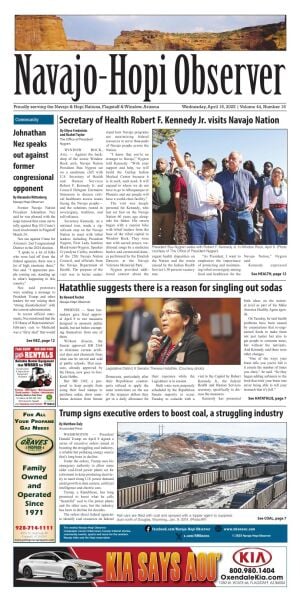The Naabik’íyáti’ Committee of the Navajo Nation Council unanimously passed Legislation No. 0028-25 March 28, calling on the U.S. government to uphold its trust and treaty obligations by consulting with the Navajo Nation before implementing policies or executive actions that impact tribal education.
This legislation was introduced in direct response to a February 14 memorandum from the U.S. Department of Education’s (ED) Office for Civil Rights. The memo, signed by Acting Assistant Secretary for Civil Rights Craig Trainor, warned that federally funded educational institutions could risk losing federal funding if they engage in race-based practices, including affirmative action and Diversity, Equity, and Inclusion (DEI) initiatives.
“Acting Assistant Secretary Trainor’s memo creates uncertainty for programs that are vital to our students,” Delegate George Tolth said. “This legislation is about protecting our treaty rights and ensuring that Navajo students are not left behind due to a misunderstanding of our political identity.”
The committee expressed concerns that the ED’s memo fails to acknowledge the political status of federally recognized tribes, treating them instead as racial groups.
The legislation reaffirms that educational programs serving Navajo and other American Indian and Alaska Native students should not be categorized under the racial classifications outlined in the Department’s guidance. Such a misclassification, the committee argues, undermines tribal sovereignty and disregards the unique legal relationship between tribal nations and the U.S. government.
The Naabik’íyáti’ Committee emphasized that Native American tribes are not simply ethnic or racial groups but sovereign political entities recognized through a government-to-government relationship with the federal government. The resolution cites foundational treaties between the U.S. and the Navajo Nation, including the Treaties of 1849 and 1868, which establish the federal government’s legal obligation to provide educational funding and services.
These obligations are further reinforced by Supreme Court precedent, notably the 1974 Morton v. Mancari case, which ruled that preferences for tribal citizens in federal programs are based on political, not racial, classifications.
“The failure to make this distinction in the ED’s guidance risks the misapplication of civil rights law to tribal programs and could jeopardize educational resources for our youth,” Tolth added.
The legislation also raises concerns about the potential impact on tribal scholarship programs, particularly those administered by the Office of Navajo Nation Scholarship and Financial Assistance, which provide essential financial aid exclusively to enrolled Navajo Nation members.
The ED’s accompanying FAQ states that race-restricted scholarships may not be advertised or administered by educational institutions, a stipulation that could interfere with the administration of tribal aid programs at colleges and universities.
In response, the Navajo Nation formally requests a tribal consultation with the Department of Education to clarify the implications of its February 14 letter and to ensure that future policies respect the sovereign status of Indian tribes. The Nation also calls on the federal government and its agencies to reaffirm their commitment to honoring all treaty and trust responsibilities.
Additionally, Delegate Dr. Andy Nez introduced a directive calling for a leadership meeting to address the Navajo Nation’s response to recent executive orders and memorandums issued by President Trump.
The committee unanimously approved the directive, instructing the Office of the President and Vice President, the Office of the Speaker, and the Navajo Nation Washington Office to coordinate a meeting no later than April 10.
With a vote of nine in favor and none opposed, the Naabik’íyáti’ Committee passed Legislation No. 0028-25, reaffirming the Navajo Nation’s stance on protecting its sovereign rights in education.





